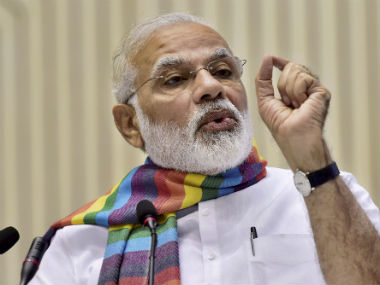There is a false notion that prevails among certain sections of Indian citizens – that the Union government is the boss and the state governments are underlings to the boss. This assumes a hierarchical relationship between Centre and states. That is constitutionally and politically false.
However, ever since the inauguration of the Indian Union republic, the Union (erroneously but popularly called the Centre) government has been encroaching upon the most sacred part of the Constitution of India. That is the separation of powers between the Union and the states. The pace of this encroachment has quickened under Narendra Modi’s prime ministership.
On 22 October, Modi, in a rally in his native state of Gujarat, termed the Opposition-ruled states as anti-development and said that the “central government would not dole out a single penny to such states”. What used to be done in the recent decades, after the collapse of the Congress majority system, through unofficial coercion, payment delays and legal jugglery has now degenerated to a situation of an open threat. This is a moment of reckoning.
Following up that anti-Constitution statement about cutting off funds to the Opposition-ruled states, he touted the advantages of having the same party’s government at the Union and the states. The message is clear for those who wish to listen. What Modi has essentially said is that it will cut off funds to the Opposition-ruled states on the Centre’s whimsical definition of ‘development’ and if the people of such states do not want this consequence, they should vote for the same party in the state that rules at the Centre. Or else.
This stops only barely short of calling for a one-party rule in a multi-ethnic, multi-national, multi-lingual polity like the Indian Union. The only check to such quasi-dictatorial aspirations is the citizens themselves and their right to political representation through elections. With the conduct of the Election Commission of India with regards to the well-timed delay in the declaration of Gujarat Assembly election dates, that enabled Narendra Modi to announce and inaugurate a slew of projects in Gujarat, questions are bound to rise about the neutrality of the Election Commission itself.
The present Chief Election Commissioner of India Achal Kumar Joti, was previously the chief secretary of Gujarat under the chief ministership of Modi . I leave it to the readers to judge what that means.
Siddaramaiah, the chief minister of Karnataka, responded to the bullying threat from Modi by sternly reminding him “where the Centre got its money from? It’s from states only - through various kinds of tax.” The Union has no money of its own beyond what it raises from revenues from the states themselves. Thus, to tell a state to behave according to New Delhi’s wish to get money that it got from the people and resources in the state is as dangerous as it is absurd.
Thus, Modi’s pretence of being a dole-giver holds good only for those who have no idea about the Constitution. Thus, Siddaramaiah added that Modi’s statement about not giving money to states according to New Delhi’s whim reflects “a lack of understanding of the Constitution”. The Karnataka premier rightly added, “what the Centre gives the states is not charity. It is our right”.
In fact, Karnataka and most other major non-Hindi states, most of which are ruled by non-BJP parties, have a special reason to be especially angry at the prime minister’s statement about not giving money to non-BJP states. That is because, it is mostly the major non-Hindi states that are the sources of the so-called “central funds”, which are then channelised by the Union government to subsidise the revenue-poor Hindi states, almost all of which are ruled by the BJP.
Thus, if one looks at this scenario from a linguistic state and revenue collection source state standpoint, Modi’s threat can also be looked upon as follows. A prime minister, who owes his majority in the Lok Sabha largely to MPs from Hindi states who don’t generate enough revenue to even pay for themselves, is telling most non-Hindi states that their money will be taken by the Centre and will be given to Hindi states while the non-Hindi states themselves will not get any share of the money they themselves contributed to the ‘central funds’ unless they agree with the political and development vision of the Centre.
I stress on this Hindi/non-Hindi divide precisely because the rallying crying of the BJP and its ideological bedrock is precisely captured by its semi-fascists slogan of yore, Hindi-Hindu-Hindustan. About 70 percent of BJP’s seats in the present Lok Sabha come from states where Hindi is the primary official language, while these states represent only 40 percent of the seats in the Parliament.
The separation of powers between the Centre and the states is the most sacred agreement in the Constitution of any diverse federal union. The Indian Union is no exception. The fiscal arrangement that enables the Centre and the states to execute its own autonomous functions independently is what makes a federation succeed. Tinkering with this arrangement or threats about withholding rightful revenue claims, which in any case is stacked against the non-Hindi high-revenue low-population growth states, is an attack on the unity and integrity of the Indian Union itself.
The 14th Finance Commission has already changed the rules of revenue distribution so that a greater amount of funds collected from non-Hindi states end up going to Hindi states, as the new criteria rewards those states which have failed to control their population. When this sort of cash transfer via the Delhi route from certain non-Hindi states to Hindi states become very acute, it results in huge resentments. That never ends peacefully.
Catalonia is the most recent case in point where Madrid milked Catalonia for decades to subsidise other provinces under Spanish administration, only to find itself in the present explosive situation. The Union government shouldn’t push things too far. Threats about denying funds to the biggest revenue contributing states certainly don’t help. If I am producing the cash and you take my cash, give it to others and also threaten to not give me the small bit of my own hard-produced cash, then at some point in time, the idea of not paying you cash in the first place will pop up in my mind. It is pretty basic.
In addition to threats, what the Union government does often to blackmail a state is to be delay payments that are a matter of right. Furthermore, it uses its discretionary powers for discrimination as evidenced recently by not giving any flood relief funds to West Bengal but paying huge sums to Bihar, Gujarat, Assam and even Nepal.
Threats, delays and discrimination aside, the Union government has already started moving on the no-money-if-you-don’t-agree-with-us policy through unelected and extra-constitutional bodies like the Niti Aayog. This body of BJP-appointed people with no constitutional authority has actually advised the Union government to give money to states under certain schemes not because it is the right of the people of the state but based on how well the state’s government implements ‘reforms’ – ‘reforms’ being a catch-all term for what the Union government thinks is right.
Thus, on various issues, which are under absolute autonomous powers of the state, the Centre wants to decide policy with the state becoming just a local implementation agency for Delhi’s whims and wishes. This is a dangerous thing to do because it violates the basic idea of State autonomy and hence, the autonomous political expression of the people of a state with regards to state list and concurrent list subjects of the Constitution. That is a direct violation of democracy and hence a violation of the sovereignty that resides in the people and is expressed autonomously and separately through Union and state governments.
Right from 1947, the Congress used its super-majority to give Delhi the major revenue grabbing powers. BR Ambedkar warned against this tendency and had maintained that States should have adequate revenue and that the Constitution did not allow for that – he only drafted a Constitution that could pass a Congress-dominated Constituent Assembly. He said while moving Draft Article 264A (which became Article 286 of the finally adopted Constitution):
“Although I am prepared to say that the financial system which has been laid down in the scheme of the Draft Constitution is better than any other financial system that I know of, I think it must be said that it suffers from one defect. That defect is that the provinces are very largely dependent for their resources upon the grants made to them by the Centre. As well as know, one of the methods by which a responsible government works in the power vested in the Legislature to throw out a Money Bill. Under the scheme that we have proposed; a Money Bill in the Province must be of a very meagre sort. The taxes that they could directly levy are of a very minor character and the Legislature may not be in a position to use this usual method of recording its ’no confidence’ in the government by refusing taxes. I think, therefore, that while a large number of resources on which the Provinces depend have been concentrated in the Centre, it is from the point of view of constitutional government desirable at least to leave one important source of revenue with the provinces.”
The GST has just recently destroyed that remaining power of the states to independently raise its own revenue by changing tax rates according to its wish. Thus, by the Union’s whims, a tendency of penalising some states for their prosperity so that Delhi can maintain its political base elsewhere by cross-subsidising the Hindi belt laggards has been followed almost as a matter of principle.
West Bengal was an early victim of this policy. Tamil Nadu and Karnataka are among the major victims now. In fact, a fundamentally different take on how revenue is to be distributed by whom to whom is conceivable in the Indian Union. The Union government has its own budget. This can be presented as a document for states to consider. Then the States can contribute according to its population proportion. That is the essence of any federal system because the Union government, at the end of the day, has no real business interfering in anything that happens fully within a state.
Apart from the grouping element, that was the essence of the Cabinet Mission Plan which could have kept the British South Asian Empire united. As recently as August 2016, West Bengal chief minister Mamata Banerjee has reiterated that the Union government should have only four ministries - defence, external affairs, railways and finance (only monetary policy, that is). This sort of a structure will preclude the repeated assaults on the federal structure of the Indian Union and will ensure its long-term unity and integrity.
Let me end with what we started – the threat to not give funds to Opposition-ruled states. Modi or for that matter Union government prime ministers before him have gotten away with saying such things, where it seems that Delhi is some kind of master and the states are slaves or children because they have taken advantage of the deliberate misconceptions that Union governments have spread over the decades about the nature of the Indian Union and its federal structure.
So, let us get certain things straight. Centre and state don’t have a parent-child or master-slave relationship but a relationship involving division of responsibility, jurisdiction, revenue and power. The Centre or Delhi is not responsible for the ‘country’. It is only responsible for subjects in the Union list and if it wants, for subjects in the concurrent list of the Constitution.
The subjects contained in the state list, which include things as crucial as land, law and order, public health, and agriculture are the state’s business only and none of the Union’s business. That’s precisely why Centre’s pre-conditions and ‘assessments’ on funds to be disbursed for state subject purposes is so objectionable. It is none of Delhi’s business.


)




)
)
)
)
)
)
)
)